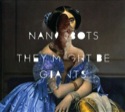
They Might Be Giants
Nanobots
Idlewild
Even after more than three decades of performing and seventeen studio albums (that’s counting their “young listener” forays like Here Come the ABCs, which have proven stronger than some of their standard releases), there is, I think, still a lingering fear in the minds of longtime fans of They Might Be Giants that the group’s newest album, whatever form it happens to take, will reveal them as the novelty act we’d always secretly feared them to be. The idea of an unbroken stream of confectionary earworm pop that succeeds in juggling droll humor, unabashed bookishness, and childlike enthusiasm just seems a bit too good to be true.
And while some of TMBG’s later albums clearly haven’t measured up to that heady rush of early discs like Lincoln (1988) and even John Henry (1994) – the band hit a conspicuous low in the post-Elektra 2000s with Mink Car, The Spine, and The Else as they simultaneously branched out into TV, film, and literature – there are no abject clunkers in their discography that rank alongside, say, Metal Machine Music (RIP, Lou) or Bowie’s Never Let Me Down. (Given the aforementioned fear, the overwhelming temptation here is to tack on the qualifier “yet” or “for now.”) TMBG’s self-extrication from that nadir was evident with 2011’s solid, immensely listenable Join Us, their first “proper” LP following a four-year gap mitigated only by two more Here Comes… children’s albums. Tracks like “Cloisonné” and “When Will You Die” had the vibrant brass-and-reed energy of John Henry; they were complemented by the toe-tapping, head-bobbing guitar rock of “Celebration” and “Canajoharie.” The Johns’ whimsy was in evidence, too, such as Flansburgh’s helium-high vocals on “Dog Walker” or the Linnell-led oompah dubstep of “2082.” Unlike the trio of albums that preceded it, very little of Join Us seemed forced or duty-bound, and it re-embraced the heterogeneity of style that has characterized TMBG’s best output.
That heterogeneity is even more prominent across the twenty-five tracks of the aptly titled Nanobots, released back in the spring of this year. Its unusually elevated song count might call to mind the 38-song Apollo 18 (1992), and not without good reason. Somewhere just before its midpoint, Nanobots revisits the hyperactive songwriting of Apollo 18’s “Fingertips” with six- to fifteen-second nano-songs like “Hive Mind” (which lasts only as long as it takes to sing the title twice) and “Decision Makers” (a snippet from some grandiose contemporary political opera). These melodic soundbytes aren’t contiguous, though, so their rapid-fire succession is interrupted by songs with more conventional three-minute running times like “Replicant,” a spooky Blade Runner waltz in dialogue with vibes and a synthesizer, and “The Darlings of Lumberland,” a collision of klezmer and club remix. The effect, oddly enough, is that this mixed company serves to obscure the ephemerality of the shorter tracks. Think back to the sparkle and bounce of “Nouns,” even after repeated listens: Surely there’s a build and then a chorus? Nope, it never makes it past line six of the first verse. The stop/start doppelgänger paranoia of “Sleep”? It just about gets to the same point before ending mid-drumbeat.
The downside of this trompe l’oreille is that the interspersed songs that are allowed to spread their wings don’t always manage to fly. At just over two-and-a-half minutes, the lackluster ballad “Sometimes a Lonely Way” seems positively interminable relative to the sixteen-second “Destroy the Past” that follows. “Insect Hospital” only hits a running time of about ninety seconds, but its gritty wah-wah guitar jam could have easily been cut in half in favor of allowing “There” (sung by Flansburgh’s wife Robin Goldwasser) or “Sleep” more room to develop.
Although Nanobots feeds off this juxtaposition of long(-ish) against short, the album still has a number of single-worthy standalone tracks. “You’re on Fire,” a jumpy stereophonic chat-up (with an amusing video featuring Orange Is the New Black’s Lauren Lapkus) that interprets its title literally, and “Lost My Mind,” a slower number that does the same, have already been released to those ends, along with “Circular Karate Chop” (a retro-gamer rocker) and “Call You Mom” (an oedipal ode in ’50s swing rock style). “Icky,” a surprise delight about the sort of “life-draining leech” that is the habitual borrower, has also been sent out into the world accompanied by a video. The title track, which wouldn’t have been at all out of place on John Henry, is lively and clean and for the most part unassuming. Hours later, its staccato verses are stuck in an infinite loop on your brain’s reel-to-reel.
All that makes the ho-hum moments on Nanobots both short-lived and rare. On the throwaway “Tick,” for instance, the last reverberations of the piano have faded by the ten-second mark. And the by now obligatory homage to a historical figure – in this case, “Tesla,” flaccid with saccharine tenderness – Â is over before it’s had time to completely kill the buzz after “Call You Mom” and before “Sleep.”
Had TMBG continued their slide into passability that roughly coincided with the start of the century, the band would still have had a remarkably good run, but it would likely have given some validity to those novelty act fears (their children’s albums, clever as they are, wouldn’t have been the ideal counterevidence). Starting with Join Us, though, TMBG has, consciously or not, reignited a vital creative spark, a phenomenon that continues with Nanobots. It’s not that the songs are necessarily catchier;Â catchiness has never been an issue with TMBG. It’s more like they’ve developed a collective crush on music-making again, and their genuine euphoria permeates nearly every song and consequently the album as a whole. There isn’t quite the same palpable, effortless exuberance as on Flood (1990) or their self-titled 1986 debut (after all, aging exempts no one, not even the young at heart), but they’re still a long, long way off from novelty act. For now?












